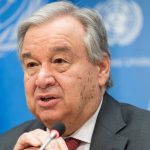Jamaica PM calls for Global Plan Similar to Marshall Plan

(Caribbean Media Corporation) – Jamaica Tuesday called for a global plan that is as “innovative, ambitious and impactful” as the Marshall Plan was to Europe’s recovery after the devastation of World War II.
Addressing the virtual UN High-Level meeting on “Financing for Development in the Era of Covid-19 & Beyond,” Prime Minister Andrew Holness said much more will be required of all of member countries and without delay.
“The scope of this pervasive pandemic clearly demands an extraordinary, inclusive and sustainable global management and recovery process. However, as public finances around the world come under pressure, attracting and leveraging private capital is a critical part of the recovery,” Holness said as he joined his co-conveners, Prime Minister Justin Trudeau of Canada and UN Secretary General, Antonio Guterres, in welcoming Heads of State and Governments to this high-level discussion.
Holness said that governments have started to implement fiscal and other measures to address the most urgent consequences and that multilateral financing institutions, notably the World Bank, the International Monetary Fund (IMF) and regional banks have mobilised support.
“Caribbean islands, with heavy dependence on service industries, particularly tourism have been among the most severely impacted. The poor, the vulnerable and our women have been primary victims.
“The reality for developing countries is one of overburdened health systems, weak infrastructure and inadequate fiscal resources to respond effectively to the social and economic consequences of the pandemic,” Holness said.
He told the conference that the proposals to be discussed focus on the immediate crisis response, securing a recovery that is based on strengthened resilience, and transitioning over the long-term to green, inclusive and sustainable development.
“The increased use of virtual platforms as an alternative to the customary physical engagement for human development and business continuity processes, makes it imperative for all countries to have access to digital technology and reliable connectivity.
“This, therefore, must be a priority area of support for developing countries. Also of priority concern is the critical need to ensure that vaccines will be accessible to all countries on an equitable basis,’ Holness said, adding that ‘some interesting proposals have been submitted that merit consideration, not least of which are policy options that address the need for new concessional financing mechanisms.
“Colleagues, as we take this process forward I urge us to gather momentum in implementing viable solutions to the mounting challenges that have continued to beset our countries and peoples. Our survival is fully dependent on managing COVID-19 in this era and beyond.
He said some interesting proposals have been submitted that merit consideration, not least of which are policy options that address the need for new concessional financing mechanisms.
“This, therefore, must be a priority area of support for developing countries. Also of priority concern is the critical need to ensure that vaccines will be accessible to all countries on an equitable basis.
“We are grateful to our Ministers of Finance and other contributors for putting forward a rich slate of policy options to increase resource availability, address debt and liquidity concerns, and respond to the short, medium and long-term needs of developing countries in particular.
“We must seize the opportunity this time around to make the global recovery plan; sustainable to our climate and environment, empowering and uplifting of the poor, vulnerable and marginalised in our societies, and supportive of democratic and transparent governance,’ Holness said.
“The world needs a global plan as innovative, ambitious and impactful as the Marshall Plan was to Europe’s recovery after the devastation of World War II.”
The Marshall Plan, also known as the European Recovery Programme, was a United States initiative providing aid to Western Europe following the devastation of World War II. It was enacted in 1948 and provided more than US$15 billion to help finance rebuilding efforts on the continent.
Holness recalled that when delegates last met in May “the huge dimensions and devastating consequences of the COVID-19 crisis were already evident.
“It had become clear that this crisis was multi-dimensional; it was not only a health crisis but also an economic crisis. COVID-19 has had a grave impact, having taken over a million lives and impacted the livelihoods of hundreds of millions,” Holness added.
Latest figure show that the virus, which was first detected in China last December has been linked to one million deaths and the infection of 33.4 million others worldwide.
Source: CARICOM TODAY

 Previous Post
Previous Post Next Post
Next Post